Andrew Fagan: Bringing Back The Mockers (Interview)
After a 30 year hiatus, The Mockers are getting back together to play a series of New Zealand dates beginning this Thursday in Hamilton. The Mockers, fronted by Andrew Fagan, were one of the most successful Kiwi bands of the 1980s with hits such as Forever Tuesday Morning, Swear It’s True, One Black Friday, My Girl Thinks She’s Cleopatra and Shield Yourself.
The 13th Floor’s Marty Duda spoke to Andrew Fagan just before the bandmembers were due to get back together for the first time since 1987. Andrew begins the conversation by explaining why the band is back together now.
Click here to listen to the interview with Andrew Fagan of The Mockers:
Or, read a transcription of the interview here:
AF: We got approached by the Christchurch Beer Festival, and they wanted The Mockers, and it sort of jogged a memory in my mind – that’s right, that was something that I used to do – and then it was like, “Well, okay, why not?” It’s time a capsule, in a way; it’s a retro time capsule. For me, it was 1980 until 1986 in New Zealand that we occupied that space as a band; and if everyone else was into it, why not, before we die?
MD: Did it take much talking into, to approach the other guys and decide whether or not they were in?
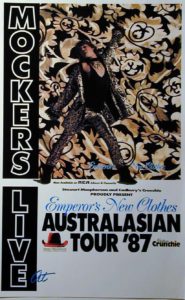
AF: Pretty good, actually. I was surprised with the response. To be honest, I haven’t seen – and still haven’t seen – Tim since 1986-87, on the last Mockers tour, Emperor’s New Clothes; he went to Australia, I went to England via LA, and the bass player, Geoff: he went to England as well in 1988 – I don’t think he’s ever been back until… I think he touches down tomorrow morning, to be honest – so, it’s kind of like everyone went off and lived separate lives, and this is actually a really interesting combination of time and place.
MD: Today is the twelfth, and I think the first date that you’re doing is the nineteenth. You’re telling me that you haven’t actually gotten together and rehearsed yet?
AF: No, we start on Monday. The thing is that we’re professional musicians here: we all practice privately, don’t we?
MD: Sure!
AF: You work out what you’ve got to do, and then when it comes together, it becomes cohesive; and honestly, three days is more than enough to kick off a six year tour.
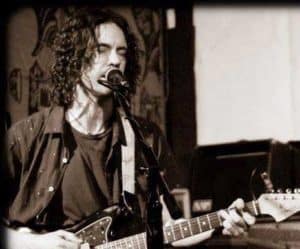 MD: One person – because he’s around, and I see him play a lot – is Brett Adams – and I think he’s a phenomenal guitar player. I know he was a late addition to the band; did you discover him? How did you find him?
MD: One person – because he’s around, and I see him play a lot – is Brett Adams – and I think he’s a phenomenal guitar player. I know he was a late addition to the band; did you discover him? How did you find him?
AF: I don’t know if Brett would want me to tell the truth…
MD: Oh, come on.
AF: … people come and go with bands – it’s a life style, isn’t it? Especially when it’s a poverty stricken life style – so, Dean Heazelwood – he’ll be joining us for our Auckland gig: he’s going to be playing at The Powerstation… he chose to leave the band for… I think it was girlfriend reasons; I can’t really remember, but we had to find another guitarist. And I remember auditioning people at Russell Crowe’s venue – which in those days was called The Venue – at the top of Symonds Street; and Russell was strutting around in his leather gear, pretending to be Elvis in that leather period – with his bunch of keys, and telling the children off for not filling up the soda stream properly; but still enthusiastic; you had to hand it to him – and so, Brett came along there, and we auditioned him. And we got him to improvise the lead guitar solo on Alvison Park and Brett was amazing; and Brett still is, and I’m very fortunate that we got him in the band.
MD: Have you been looking back through the catalogue, and listening back to the original recordings to get yourself worked up for this thing?
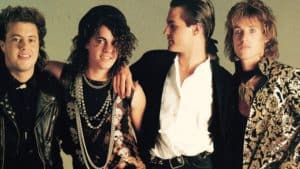 AF: Yeah, I’ve got my corset and my wig on, and I gyrate, and I’m sweating! No, I’ve definitely got the songs down. They’ve never really left me, to be honest. When you write a song, they kind of get ingrained in a certain part of your brain, and you can’t release them… they’re there; and it’s amazing how they just come to the forepart of your brain when you have to start singing it.
AF: Yeah, I’ve got my corset and my wig on, and I gyrate, and I’m sweating! No, I’ve definitely got the songs down. They’ve never really left me, to be honest. When you write a song, they kind of get ingrained in a certain part of your brain, and you can’t release them… they’re there; and it’s amazing how they just come to the forepart of your brain when you have to start singing it.
MD: You mentioned that you’re gyrating and getting your clothes on for the show: I saw the museum exhibition, Volume; and it has your costume from The Mockers. Are you going to get it back for the tour? The fuzzy suit.
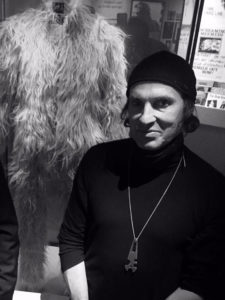 AF: I can’t be bothered entering into negotiations with the museum to get that one, but I’ve got a few other ones up my sleeve; that’s no issue. I had a ton of stuff; and show business was a big part of the band. I always enjoyed showing off, and still do: I play with my current band, Fagan and The People, and I still use my gold suit from 1985 – during The Mockers’ Emperor’s New Clothes album – and I still wear my apricot jacket that I bought from a second hand shop in Timaru in 1983 – I guess you’d call it a ‘new romantic’ jacket. These are things that live on, and why disregard them? And they go with the songs, and the songs stand up, I think, over the passage of time; and it’s going to be great fun playing them again.
AF: I can’t be bothered entering into negotiations with the museum to get that one, but I’ve got a few other ones up my sleeve; that’s no issue. I had a ton of stuff; and show business was a big part of the band. I always enjoyed showing off, and still do: I play with my current band, Fagan and The People, and I still use my gold suit from 1985 – during The Mockers’ Emperor’s New Clothes album – and I still wear my apricot jacket that I bought from a second hand shop in Timaru in 1983 – I guess you’d call it a ‘new romantic’ jacket. These are things that live on, and why disregard them? And they go with the songs, and the songs stand up, I think, over the passage of time; and it’s going to be great fun playing them again.
MD: I know that originally, you started out as The Ambitious Vegetables in ’79, and then transformed into The Mockers; and originally, it was a very punky kind of sound, and it moved to what you ended up – I guess it would be new wave, or new romantic. In your mind, how did that musical transformation happen?
AF: It was deliberate. I’ve always been a music enthusiast and a practitioner at a very basic level, to be honest; and to start with, all I could do was organise the band, The Ambitious Vegetables, and jump around and shout, really. The transition to actually singing, and try to sing a melodic tune and master the art of singing, took me a long time; and I’m sure lots of people would agree with that! But as the years went by, that’s what The Mockers were about: it was like moving from just jumping around and shouting in a punk rock band, to trying to sing something melodic; because that was a natural progression, really; very simple, honest gain. That’s the wonderful thing about song writing: it’s just a very simple, honest gain: you write a song, and then you dispatch it – you put it out; it’s recorded; it’s gone – some people might like it, some people might denigrate it, and might not like it; but essentially, it’s a simple, honest medium.
MD: And as far as the song go, you must feel that they stand up over time. When you listen back to them, do you have second thoughts about them? Are you pretty proud of how they turned out? How do you feel about them now? It’s, like, thirty years later.
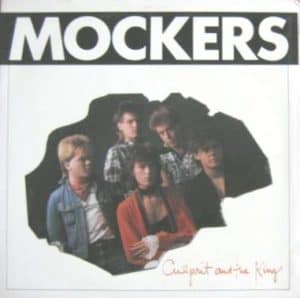 AF: Yeah, I have huge second thoughts! I listen to drum sounds, and I cringe! I cringe with all those ‘80s, early ‘80s sounds; all the producers that we had that convinced us that this would be the best way to present the song. I think it was called AMS: it was a digital delay. When we did the Culprit and The King album in Sydney, they had about three AMSs lined up on the desk… and there were no cymbals; and it was just that horrible, early ‘80s production. I listen to things, and all I hear is the faults in the production, but the song still resonates through that. It was just a product of its time. And as the years have gone by, and I’ve persevered, there are probably sounds that I employ now, in modern recordings, that, perhaps, I’ll regret later on; but it’s just the way it was.
AF: Yeah, I have huge second thoughts! I listen to drum sounds, and I cringe! I cringe with all those ‘80s, early ‘80s sounds; all the producers that we had that convinced us that this would be the best way to present the song. I think it was called AMS: it was a digital delay. When we did the Culprit and The King album in Sydney, they had about three AMSs lined up on the desk… and there were no cymbals; and it was just that horrible, early ‘80s production. I listen to things, and all I hear is the faults in the production, but the song still resonates through that. It was just a product of its time. And as the years have gone by, and I’ve persevered, there are probably sounds that I employ now, in modern recordings, that, perhaps, I’ll regret later on; but it’s just the way it was.
MD: I’ve often thought that the world would be a lot better if a lot of the albums from the ‘80s were re-recorded now….
AF: It’s that whole drum sound thing, you know? It’s just the way it was. It’s just big; big with delays, and no cymbals. It’s just the way it was.
MD: And also that Fairlight, synth thing…
AF: Oh, yeah! Gosh! The latest sound then!
MD: So, when you go to play now, are you going to try and replicate that sound? Are you updating it? Have you thought anything about it? Was it even an issue when you were playing live, back then?
AF: Well, it wasn’t an issue then, because that’s what it was, and that’s what we were embedded in, and we all thought that that was the best representation of the song. As time has gone by, I think we could try to modify that, but I don’t think so. I think the best thing to do is to actually capture what it was, and replicate that. It was a time and moment: it’s a period of time, and I think it’s best to actually capture that whole period as it was, as best we can.
MD: I read somewhere that you played Sweetwaters in ’81, as part of the the early part of the band. I wasn’t in New Zealand at that time, but it seems to me that that was one of those legendary shows that everybody remembers. Do you have any particular memories of that thing?
AF: Yeah, we did two Sweetwaters shows. I remember there was a small stage, we played in the afternoon; that was a good one. And then playing a late night one, and we played after Knobz – …and they were peaking at the time – and then we went on. And I remember as we came onto the stage, about one o’clock in the morning, watching everyone walking away from the hillside; yeah, that was a great one! And also, those kind of gigs where you’re playing, but there’s also The Eurythmics and Talking Heads… and who was the guy who was snorting cocaine on the side of the stage all the time…(sings Avalon)
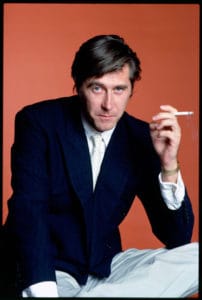 MD: Bryan Ferry.
MD: Bryan Ferry.
AF: Bryan Ferry! They played…I think they played as Roxy Music. I remember I was on stage and he kept on going – in between songs – off the side of the stage and having a big line of coke; I mean, that was one of the resounding moments. When you play with bands like that, it kind of puts your fame into perspective – or your lack of fame – so, all those festivals, to me, were always real levellers: you came away from them feeling slightly disappointed that you weren’t as popular as the main band, but nevertheless, you had a chance to play to a larger audience.
MD: Have you got any kind of feel about what kind of audiences you’re going to be greeted with this time around?
AF: No idea, to be honest. I imagine its people that, hopefully, enjoyed the band back in the ‘80s, and want to recreate some of those memories; and really, these reunion tours are about that, aren’t they?
MD: Yeah, definitely.
AF: It’s more than the band. It’s more about what those songs bring back to you from that period in time, and what you were doing as someone who heard song; that’s the way I see it.
MD: And you’ve got Chris O’Connor playing drums with you, right?
AF: Yeah! Looking forward to meeting Chris, and hope he can form the back bone that’s required; I’m sure he can.
MD: I’m sure he can. He’s an amazing drummer; so, you should be in good hands, I think.
Click here for tour dates and ticket information.
- Civil War – Dir: Alex Garland (Film Review) - April 9, 2024
- Pearl Jam – Dark Matter (Monkeywrench/Republic) Album Review - April 1, 2024
- Blonde Redhead – New Zealand Tour 2024 - March 14, 2024

January 16, 2017 @ 4:31 pm
yep,should be a goodie.Andrew’s always up for a great show.He played to all the little venues too,such as my lil ol’ hometown,Motueka,in the Post Office Hotel.Punters were a mixed bag;probably why they never did get much support from the red-necks,lol.The drummer was the intergral part of ’em.Sadly when he passed,they shut up shop.